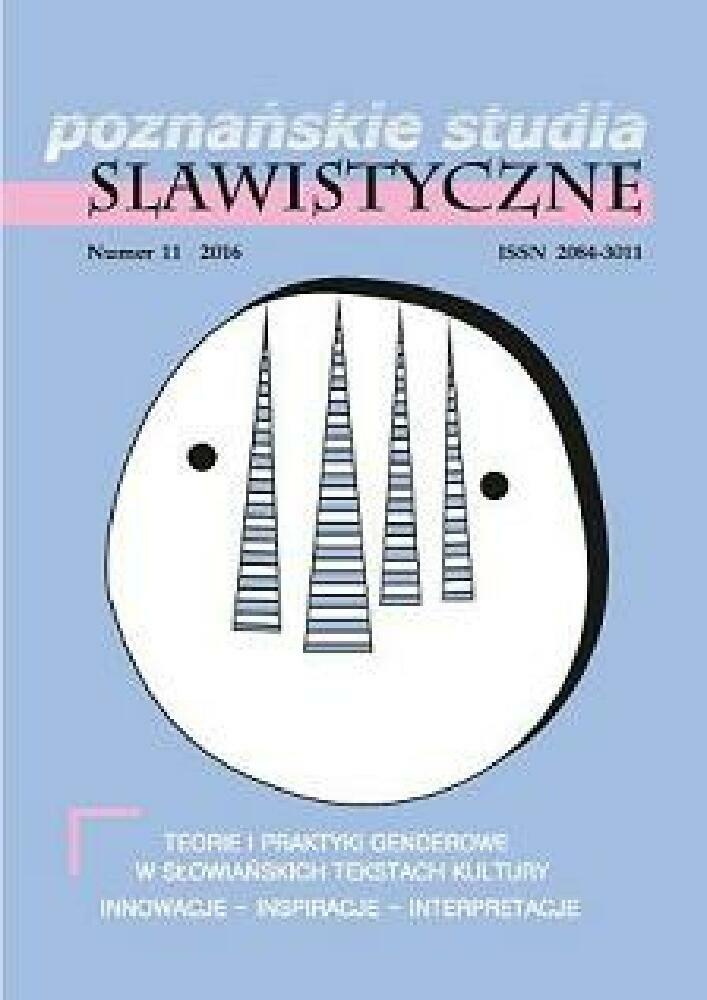Abstract
The article outlines the cultural context of Russian women who contributed to the development of decadent poetry in the late 19th and early 20th centuries, most now forgotten or “occulted” (eclipsed, crowded out). Given the importance of gender theories and “feminine” discursive space in the Silver Age, this phenomenon must be examined; it is not just a typical example of women written out of literary history. The article suggests reasons why decadence may have appealed to women as well as why Russian women who adopted a specifically decadent position might not have been taken seriously. It ends by suggesting why more famous Russian poets (especially Axmatova and Cvetaeva, whose reputations have lasted and grown) achieved more lasting influence thanks to their occulted female predecessors.References
Attwood L., 1990, The New Soviet Man and Woman: Sex-Role Socialization in the USSR, Bloomington.
Barker A., Gheith J., 2002, A History of Women’s Writing in Russia, Cambridge.
https://doi.org/10.1017/CBO9780511485930
Beaudoin L.J., 1997, Resetting the Margins: Russian Romantic Verse Tales and the Idealized Woman, New York.
Beckson K. (ed.), 1982, Aesthetes and Decadents of the 1890s: An Anthology of British Poetry and Prose, Chicago.
Belinskii V.G., 2002, Review of ‘A Victim’, in: Russian Women, 1698–1917: Experience and Expression, eds. R. Bisha, J.M. Gheith, Ch. Holden, W.G. Wagner, Bloomington, pp. 28–32.
Heldt B., 1987, Terrible Perfection: Women and Russian Literature, Bloomington–Indianapolis. Kelly C., 1994, An Anthology of Russian Women’s Writing, 1777–1992, Oxford.
Komisaruk E., 2009, Od milczenia do zamilknięcia. Rosyjska proza kobieca na początku XX wieku, Wrocław.
Landa M., 2013, The Poetic Voice of Cherubina de Gabriak in Russian Symbolism, “Slavic and East European Journal” vol. 57, no. 1, pp. 49–66.
Ledkovsky M., Rosenthal Ch., Zirin M. (ed.), 1994, Dictionary of Russian Women Writers, Westport–Connecticut–London.
Matich O., 2005, Erotic Utopia: The Decadent Imagination in Russia’s Fin de Siècle, Madison.
Pachmuss T. (ed.), 1978, Women Writers in Russian Modernism: An Anthology, Urbana–Illinois.
Presto J., 2002, Women in Russian Symbolism: beyond the algebra of love, in: A History of Women’s Writing in Russia, eds. A.M. Barker, J. Gheith, Cambridge–New York, pp. 134–52.
https://doi.org/10.1017/CBO9780511485930.009
Presto J., 2008, Beyond the Flesh: Alexander Blok, Zinaida Gippius, and the Symbolist Sublimation of Sex, Madison–Wisconsin.
Rabinowitz S., 1998, No Room of Her Own: The Early Life and Career of Liubov Gurevich, “Russian Review” vol. 57, no. 2 (April), pp. 236–252.
https://doi.org/10.1111/0036-0341.00020
Roosbroeck G.L. von, 1927, The Legend of the Decadents, New York.
Rosenthal Ch., 1992, The Silver Age: Highpoint for Women?, in: Women and Society in Russia and the Soviet Union, ed. L. Edmondson, Cambridge–New York, pp. 32–47.
https://doi.org/10.1017/CBO9780511520877.004
Showalter E. (ed.), 1993, Daughters of Decadence: Women Writers of the Fin-de-Siècle, New Brunswick.
Spender D., 1989, The Writing or the Sex?, or, Why you don’t have to read women’s writing to know it’s no good, Toronto.
Tomei Ch., 1999, Russian Women Writers, New York.
Бонецкая Н., 2012, Царь-девица. Феномен Евгении Герцык на фоне эпохи, Санкт-Петербург.
Вайман Н., Рувим М., 2011, Шатры страха. Разговоры о Мандельштаме, Москва.
Габриак Ч. де, 1999, Исповедь, Москва. Ланда М[арианна], 1999, «Миф и судьба», введение в де Габриак, introd. Ч. Исповедь, pр. 5–44.
Ланда М., 1994, Символистская поэтесса: опыт мифотворчества, “Русская литература” nо. 4, pр. 120–33.
Ученова В.В. (ed.), 1989, Царицы муз. Русские поэтессы ХІХ-начала ХХ вв., Москва.
Цветаева М., 1997, Соврание сочинений в семи томах, vol. 4, Москва, рp. 39–51.
License

This work is licensed under a Creative Commons Attribution-NoDerivatives 4.0 International License.
